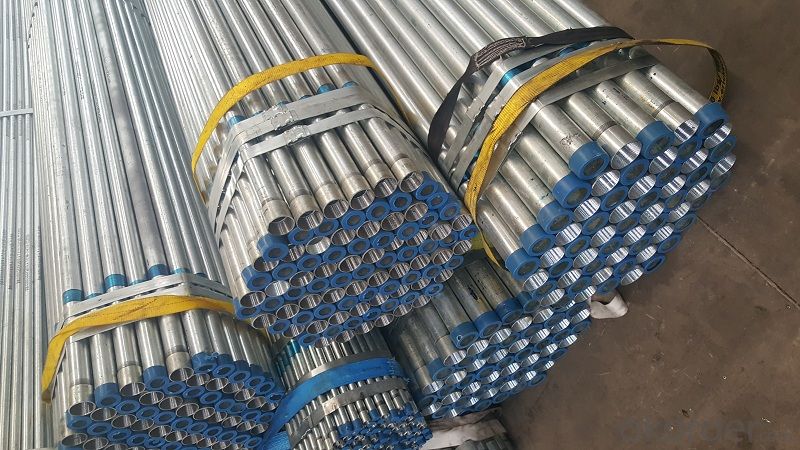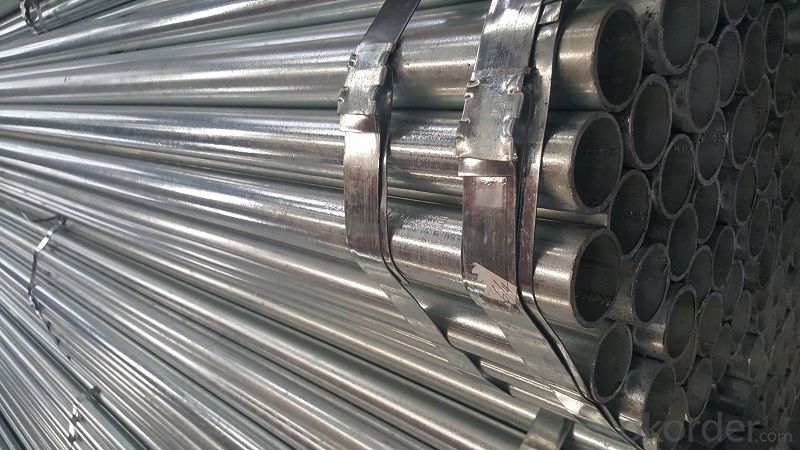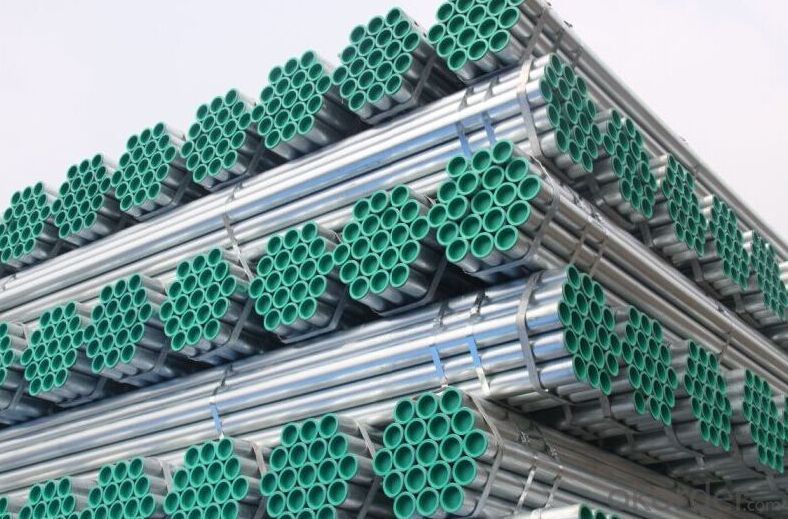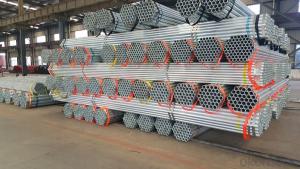Galvanized welded steel tubes for mechanical equipment
- Loading Port:
- Tianjin
- Payment Terms:
- TT OR LC
- Min Order Qty:
- 15 m.t.
- Supply Capability:
- 15000 m.t./month
OKorder Service Pledge
OKorder Financial Service
You Might Also Like
Item specifice
1、Structure of Galvanized welded steel pipe for materials :
The surface of galvanized steel pipe welded steel pipe of hot dip galvanized layer or. Galvanized can increase the corrosion resistance of the steel tube, prolong service life. Galvanized pipe is widely used, in addition to water, gas, oil and other general low pressure fluid pipelines. It is also used in the petroleum industry, especially for offshore oil field of oil well pipe and oil pipe, chemical, coking equipment of oil heater, condensation cooler, coal run oil exchanger tube, and trestle pile, the mine tunnel support frame tube.
2、Main Features of Galvanized welded steel pipe for building materials :
• High manufacturing accuracy
• High strength
• Good visual effect
• Reasonable price
3、 Galvanized welded steel pipe for building materials Specification:
Standard | GB, DIN, ASTM ASTM A106-2006, ASTM A53-2007 |
Grade | 10#-45#, 16Mn 10#, 20#, 45#, 16Mn |
Thickness | 1 - 33 mm |
Section Shape | Round |
Outer Diameter | 21 - 610mm |
Place of Origin | Tianjin, China (Mainland) |
Secondary Or Not | Non-secondary |
Application | Hydraulic Pipe |
Technique | Cold Drawn |
Certification | API |
Surface Treatment | factory state or painted black |
Special Pipe | API Pipe |
Alloy Or Not | Non-alloy |
Length | 5-12M |
Outer Diameter | 21.3-610mm |
Grade | 20#, 45#, Q345, API J55, API K55, API L80, API N80, API P110, A53B |
Standard | ASME, ASTM |
1) Material:Q195 Q235 Q345 X42 X52
2) Specification range:OD:21.3-610mm,WT:6-70mm,length:6-12m or according to the requirement of clients.
3) Excutive standards:GB,ASME API5L.ASTM A 106/A53,Despite of the above standards,we can also supply seamless steel pipe with standard of DIN,JIS,and so on,and also develop new products according to the requirements
4、Packaging & Delivery
Packaging Details: | seaworthy package,bundles wrapped with strong steel strip |
Delivery Detail: | 15-30days after received 30%TT |
5、FAQ of Galvanized welded steel pipe for building materials :
①How is the quality of your products?
Our products are manufactured strictly according to national and internaional standard, and we take a test
on every pipe before delivered out. If you want see our quality certifications and all kinds of testing report, please just ask us for it.
Guaranteed: If products’ quality don’t accord to discription as we give or the promise before you place order, we promise 100% refund.
②How about price?
Yes, we are factory and be able to give you lowest price below market one, and we have a policy that “ for saving time and absolutely honest business attitude, we quote as lowest as possible for any customer, and discount can be given according to quantity”,if you like bargain and factory price is not low enough as you think, just don’t waste your time.Please trust the quotation we would give you, it is professional one.
6、 Galvanized welded steel pipe for building materials Images:



- Q:Who knows what is the difference between double submerged arc welded pipe and longitudinal submerged arc welding?
- Double submerged arc welding is also a kind of longitudinal submerged arc welding.
- Q:How are steel pipes threaded for connection?
- Steel pipes are threaded for connection using a threading machine that cuts grooves into the pipe's outer surface. The machine rotates the pipe while a die cuts the threads, creating a spiral pattern. This threading allows pipes to be securely connected by screwing them together, providing a tight and leak-free joint.
- Q:Are steel pipes suitable for desalination plants?
- Yes, steel pipes are suitable for desalination plants. Steel pipes offer several advantages that make them a suitable choice for desalination plants. Firstly, steel pipes are highly resistant to corrosion, which is crucial in desalination plants where the presence of saltwater can be highly corrosive. The corrosion resistance of steel pipes ensures the longevity and durability of the infrastructure, reducing maintenance and replacement costs. Secondly, steel pipes have high strength and can withstand high-pressure conditions, which are often required in desalination plants. The ability of steel pipes to handle high-pressure water flow without any deformations or leaks ensures the efficient and reliable operation of the desalination process. Furthermore, steel pipes have excellent heat resistance properties, making them suitable for desalination plants that often involve heat-intensive processes such as distillation or reverse osmosis. Steel pipes can withstand high temperatures without any structural damage, ensuring the safe and efficient transfer of heated water or steam. In addition, steel pipes are readily available and have a wide range of sizes and specifications, allowing for flexibility in design and construction of desalination plants. This availability and versatility make steel pipes a cost-effective choice for desalination projects. Overall, due to their corrosion resistance, high strength, heat resistance, availability, and cost-effectiveness, steel pipes are highly suitable for desalination plants and are widely used in the industry.
- Q:What's the difference between steel pipe and pipe fittings?
- Pipe classification: steel pipe seamless steel pipe and welded steel pipe (tube) two categories. It can be divided into round tube and special-shaped tube according to the sectional shape. The round steel tube is widely used, but there are some special-shaped steel tubes such as square, rectangle, semicircle, hexagon, equilateral triangle and octagon.
- Q:What are the factors to consider when selecting steel pipes?
- When selecting steel pipes, there are several factors that need to be considered. These factors include the intended application, the required dimensions and specifications, the level of corrosion resistance needed, the operating temperature and pressure, the cost, and the availability of the specific type of steel pipe. It is important to carefully evaluate these factors to ensure that the selected steel pipes are suitable for the intended use and meet all the necessary requirements.
- Q:Can steel pipes be used for wastewater disposal?
- Yes, steel pipes can be used for wastewater disposal. Steel is a durable and corrosion-resistant material, making it suitable for transporting and disposing of wastewater safely and efficiently.
- Q:Can steel pipes be used for underground stormwater drainage?
- Yes, steel pipes can be used for underground stormwater drainage. Steel pipes are durable and have a high strength-to-weight ratio, making them suitable for underground applications. They can withstand heavy loads and resist corrosion, ensuring long-term performance in stormwater drainage systems. Additionally, steel pipes can be easily welded, allowing for customization and flexibility in the design and installation process. However, it is important to ensure proper corrosion protection, such as applying a protective coating or using corrosion-resistant alloys, to prevent degradation over time. Regular maintenance and monitoring are also recommended to ensure the pipes remain in good condition and continue to effectively drain stormwater.
- Q:How do you measure the thickness of a steel pipe?
- There are several ways to measure the thickness of a steel pipe. One common method is to use a specialized tool called a caliper or micrometer. This tool allows you to precisely measure the diameter of the pipe at various points, and by subtracting the inner diameter from the outer diameter, you can determine the thickness. Another approach is to use an ultrasonic thickness gauge, which uses sound waves to measure the thickness of the pipe. This non-destructive testing method is particularly useful for pipes that are already installed or are difficult to access. Additionally, you can also use a magnetic or eddy current thickness gauge, which relies on the principle of magnetism or electromagnetic induction to measure the thickness of the pipe.
- Q:How long are the seamless tubes? Are they six meters long?
- The usual length of steel pipe is as follows: hot rolled steel pipe 3000~12000mm and cold drawn steel pipe 3000~10500mm.
- Q:When can I use the PVC pipe and when to use the galvanized pipe?
- PVC pipeline use temperature is -5 to 90 degrees or so, according to the current market price of around 6000 yuan per ton, the price is cheap. Its corrosion resistance is good, can resist most of the acid and alkali, and unlike the steel pipe that is easy to rust, so in the construction of the upper and lower water pipes and other fields have gradually replaced the trend of steel pipe.
1. Manufacturer Overview |
|
|---|---|
| Location | |
| Year Established | |
| Annual Output Value | |
| Main Markets | |
| Company Certifications | |
2. Manufacturer Certificates |
|
|---|---|
| a) Certification Name | |
| Range | |
| Reference | |
| Validity Period | |
3. Manufacturer Capability |
|
|---|---|
| a)Trade Capacity | |
| Nearest Port | |
| Export Percentage | |
| No.of Employees in Trade Department | |
| Language Spoken: | |
| b)Factory Information | |
| Factory Size: | |
| No. of Production Lines | |
| Contract Manufacturing | |
| Product Price Range | |
Send your message to us
Galvanized welded steel tubes for mechanical equipment
- Loading Port:
- Tianjin
- Payment Terms:
- TT OR LC
- Min Order Qty:
- 15 m.t.
- Supply Capability:
- 15000 m.t./month
OKorder Service Pledge
OKorder Financial Service
Similar products
New products
Hot products
Related keywords






























